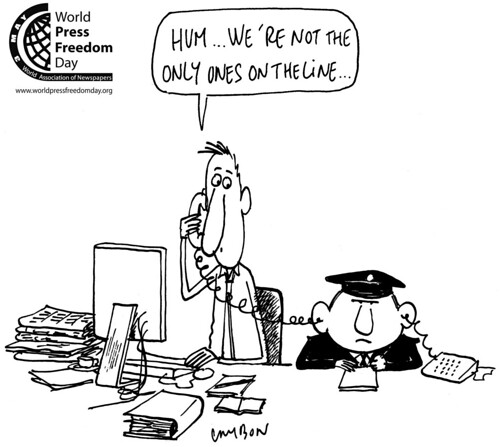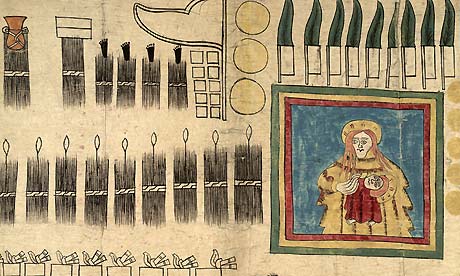 The UNESCO Headquarters illuminated
The UNESCO Headquarters illuminated
© UNESCO/N. GuyOur GWU seminar discussed the future of UNESCO last night. The two hour session began with three brief presentations>
Frank Method began the class with a discussion of demographic trends of the next 40 years. While much of the educational effort for less and least developed nations has been focused on expanding educational services both to increase enrollment and to meet the demands of increasing numbers of children, those pressures will be decreased in future decades and the numbers of children may even decrease in some countries such as China and India. On the other hand, the numbers of people over 60 years of age will increase rapidly, implying needs to educate people for their longer lives among other things. Frank pointed out that UNESCO is the logical forum for international policies to be worked out in response to these demographic trends. He also pointed out that UNESCO has been deeply involved in a number of multiyear educational programs which will end in the next few years, and there will probably be a need to find new vehicles for international cooperation. Frank suggested that in the future there would be need for more focus on educational quality, on vocational education, on higher education and on educational technology than in the past.
Ray Wanner referred back to the response of
Archibald MacLeish, the head of the U.S. delegation at the founding of UNESCO, when asked about the program of the Organization. MacLeish suggested the metaphor of a kite on the ground that would lift and fly in response to breezes and changes in the wind. UNESCO would similarly respond to currents of international thought and dialog. In fact this has happened again and again, as in the case of the creation of the
World Heritage Convention or the creation of the
Intergovernmental Oceanographic Commission. Next week the
World Digital Library will be launched, representing the latest major initiative; it was proposed in 2005 at the U.S. National commission meeting by the Librarian of Congress, and has gone through the complex approval process resulting in a network of major libraries around the world working with a platform developed by industrial partners.
Ray also described the complex governance process of UNESCO, which involves a General Conference of about three weeks every other year with delegations from all the member nations. The Executive Board, of 58 nations, has business several-week-long meetings twice a year, with additional information meetings. These cost the organization $14 million per year, and require the presence of senior staff at all plenary sessions. The next meeting of the Executive Board has 60 agenda items, for each of which the Secretariat has produced a supporting document translated into five languages.
I (
John Daly) sought to promote serious and original thinking by suggesting for discussion the proposition that UNESCO should be broken up. I summarized a critique of the diversity of programs and their lack of synergy, the governance, the system of election of Directors General, the lack of serious concern for its mission "building the defenses of peace in the minds of men", and the resultant unwillingness of member nations to budget adequately for UNESCO to carry out its many missions. I also pointed out that programs such as education, water and world heritage both met an increasing need and were widely regarded as effective within their constraints. I suggested that the United States might still have the clout to lead an effort to unbundle the programs of UNESCO, but that increasingly its influence in UNESCO governing bodies would be diminished as other countries successfully improved their economies and sought influence in world forums.
I suggested that therefore UNESCO might be broken up into a World Education Organization, A World Water Organization and a World Heritage Organization. While some programs would be abolished, others might be transferred to other intergovernmental organizations (Basic Sciences to the
Trieste System, Copyright to the World Intellectual Property Organization, Doping in Sports to the World Anti-Doping Organization, etc.).
The Discussion
The discussion generally focused on defending the continued existence of UNESCO. Arguments for UNESCO included that:
- it has a relatively well known, accepted and prestigious brand,
- there are synergies among its programs, and efforts such as those helping children in conflict situations would suffer,
- that the human rights focus fundamental to UNESCO is important, it it would probably be impossible to negotiate an agreement on a comparably strong support for freedom of expression and freedom of religion in new organizations.
It was noted that efforts to spin off programs from UNESCO were not always successful. The the MIRCEN microbiological network has gone silent when it was dropped from the UNESCO family of programs, even though such microbiological fields such as biotechnology and genetics are becoming increasingly important. In that context it was suggested that programs such as science education and vocational education which were deemphasized when the United States, the United Kingdom and Singapore pulled out of UNESCO have never been adequately restored.
Especially interesting was the discussion of the important role of UNESCO as a forum for discussion. At the General Conference heads of government and Government Ministers get a chance to meet and discuss issues in an environment that minimizes conflict and promotes reasoned discourse. During the course the role of UNESCO's
Future Forum and its ability to convene the heads of the UN agencies to work our common approaches to problems such as those imposed by the current global economic crisis were not emphasized. Thus this discussion provided an important complement to the discussions of individual programs.
The discussion also focused on my critique of UNESCO's governance and management. Arguments were advanced that modest improvements could and should continue to be made. It was also argued that while the plenary sessions of UNESCO's governing bodies tend to be dominated by diplomats, there are associated round tables "crackling with energy" at which sectoral experts do in fact provide effective guidance to UNESCO's Secretariat. It was noted that UNESCO's style of governance and management allows flexibility that is often conducive to innovation and initiative. Finally, it was suggested that while the view of UNESCO using models of top-down bureaucratic management suggest permanent problems of coordination and efficiency, newer models of networked organizations might also be applied; as the world learns more about network management we may see improvements in the efficiency and coordination of the operations of UNESCO's distributed networks of Institutes, Centers, Clubs, National Commissions, World Heritage Sites, Biosphere reserves, Associated Schools, University Chairs and Networks, etc.
While a couple of hours is not enough time to discuss the future of UNESCO in any detail, the session tended to draw upon the foundation laid during the rest of the semester to focus student attention on the future of the Organization.

























 Status of Research on the Information Society
Status of Research on the Information Society UNESCO's Basic Texts on the Information Society
UNESCO's Basic Texts on the Information Society Science in the Information Society
Science in the Information Society Cultural and Linguistic Diversity in the Information Society
Cultural and Linguistic Diversity in the Information Society Media development in the Information Society
Media development in the Information Society Measuring Linguistic Diversity on the Internet
Measuring Linguistic Diversity on the Internet Measuring & monitoring information & knowledge societies
Measuring & monitoring information & knowledge societies Education in the Information Society
Education in the Information Society Social Transformations in the Information Society
Social Transformations in the Information Society Memory of the Information Society
Memory of the Information Society Gender in the Information Society: Towards Equity?
Gender in the Information Society: Towards Equity?
